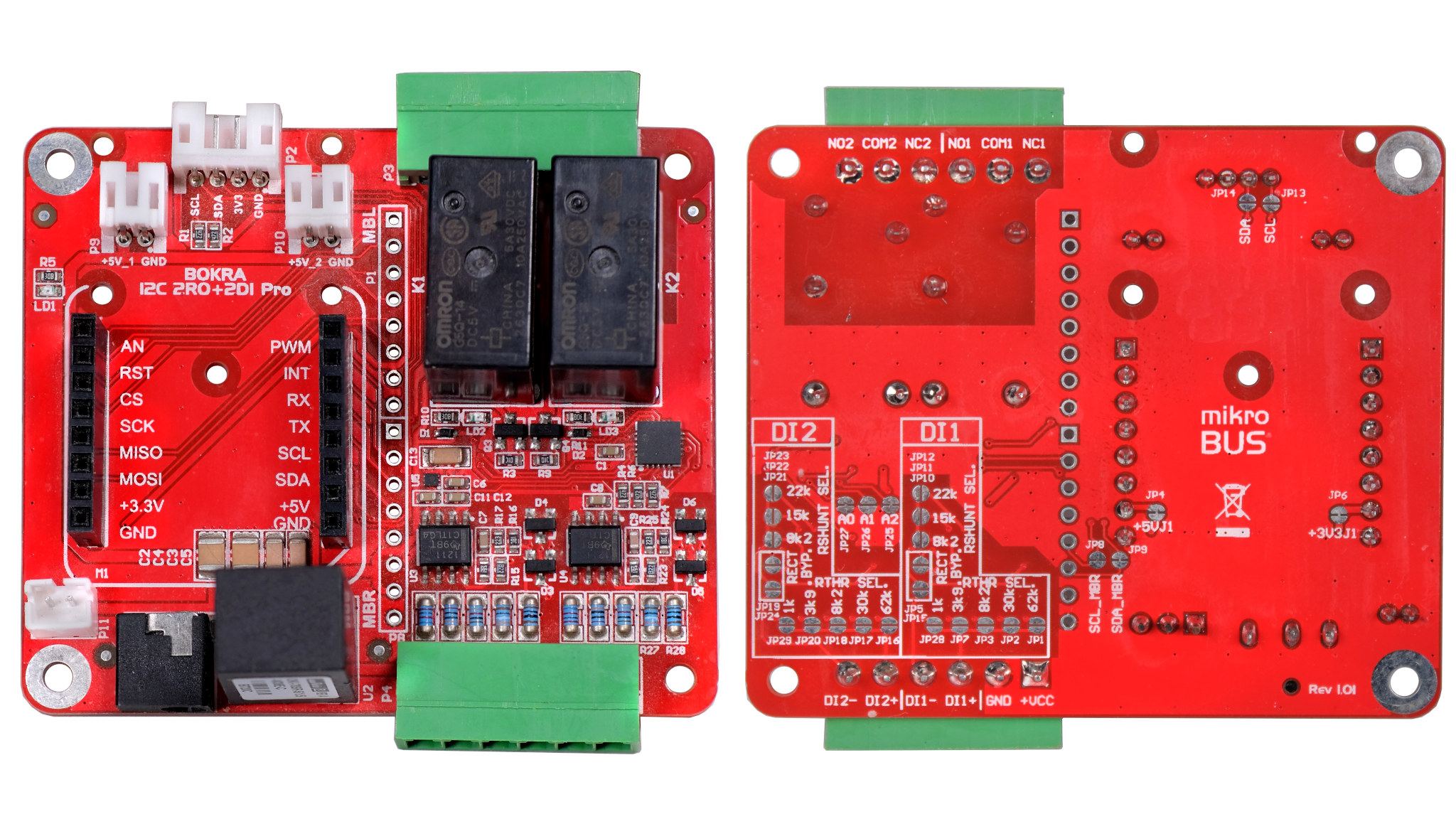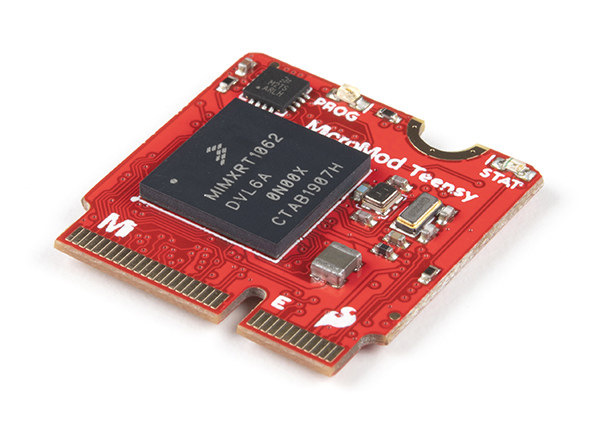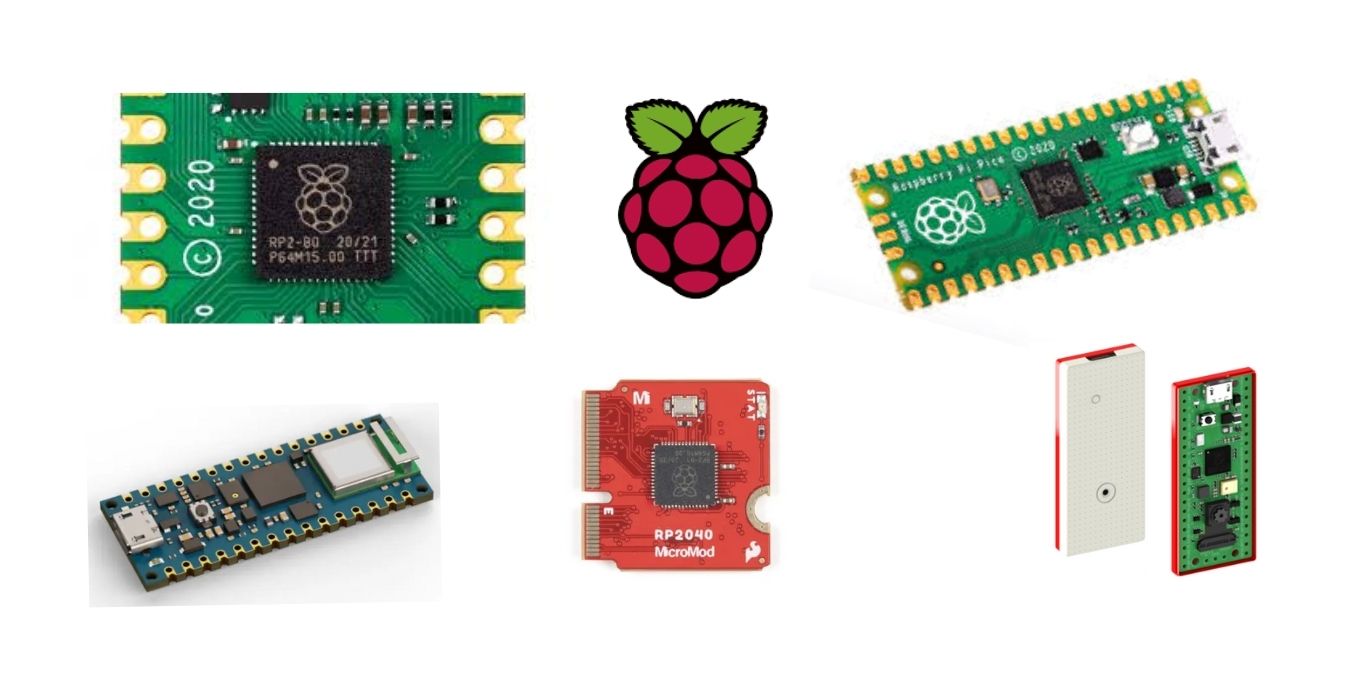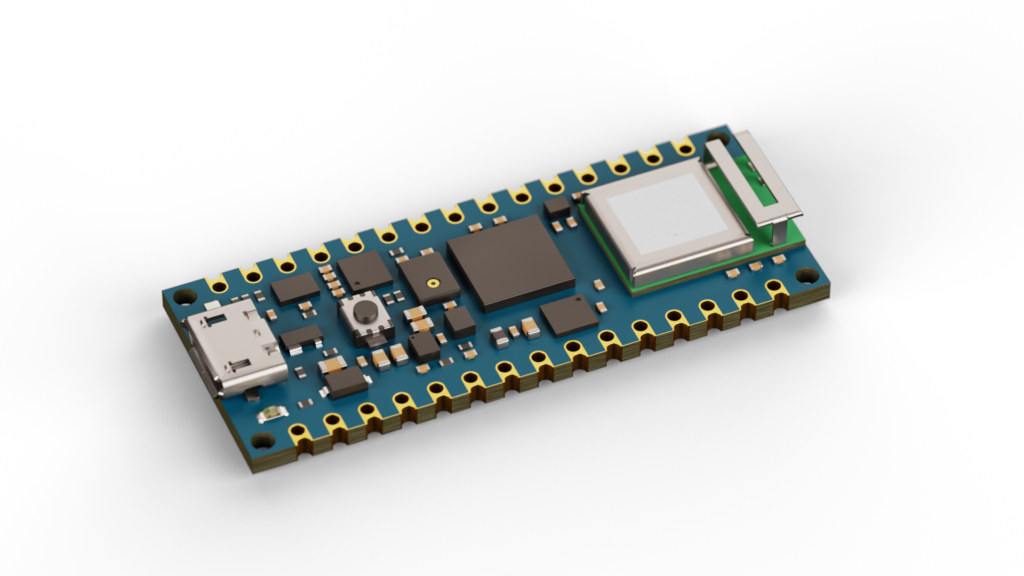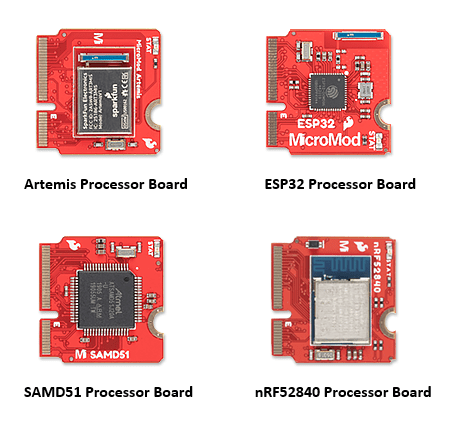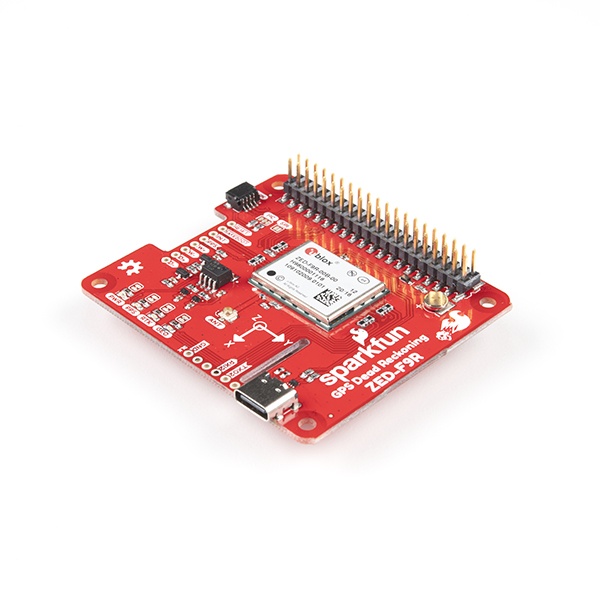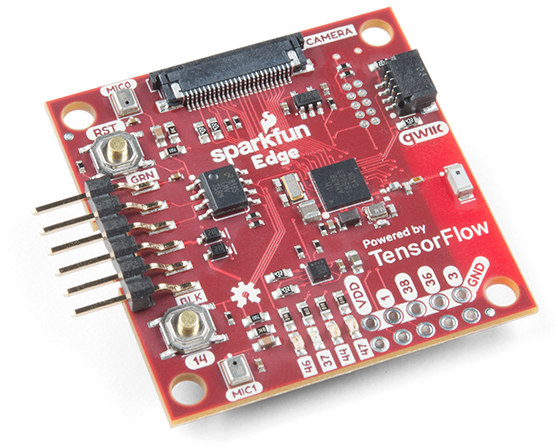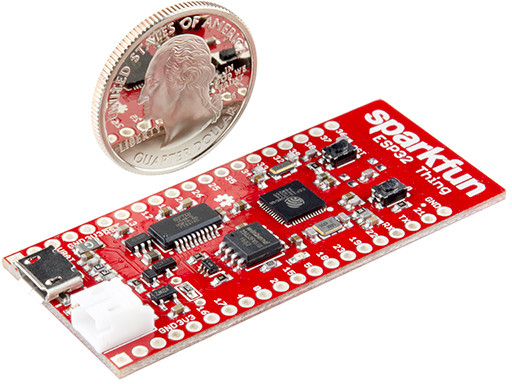AlterStep’s IoThing Digital is a digital I/O module with two high-power Omron G5Q-14 relays and two isolated AC or DC input channels based on Texas Instruments ISO1211 that can handle up to 300 V. The board also integrates a DC-DC converter and mikroBUS slot that allows it to be used with compatible MCU boards, and the company also provides adapters for popular form factors such as Arduino, Raspberry Pi, Adafruit Feather, Teensy, and others. IoThing Digital specifications: mikroBUS socket for mikroElektronika Click expansion boards BOKRA Lite MCU boards (Some details below) 2x Omron G5Q-14 SPDT relays – 3A/30V DC or 3A/250VAC via terminal blocks Terminal block for 2x digital outputs configurable from 9V to 300V, DC and AC PCF8574 8-bit I/O expander chip with I²C bus for relay control and digital signal input I2C interface with support for 100 KHz and 400 KHz, address selection via jumpers Grove I2C connector […]
MicroMod Teensy brings Teensy 4.0 board to M.2 form factor
Teensy 4.0, a low-cost board based on NXP i.MX RT1062 Arm Cortex-M7 crossover processor, is now getting a little brother with MicroMod Teensy following the same M.2 form factor as other Sparkfun MicroMod boards. Born from a collaboration between PJRC and Sparkfun, MicroMod Teensy has essentially the specs of Teensy 4.0 but with larger flash memory, and the board will be fully supported by the Teensyduino add-on to the Arduino IDE as noted by Paul Stoffregen on Twitter. MicroMod Teensy specifications: SoC – NXP i.MX RT1062 Arm Cortex-M7 processor at 600 MHz with 1024KB RAM (512KB is tightly coupled), Storage – 16MB serial flash (instead of 2MB on Teensy 4.0) M.2 MicroMod connector with USB Device up to 480Mbit/sec: Capable of enumerating as a USB keyboard, mouse, joystick, MIDI, audio, and more USB Host up to 480Mbit/sec: Capable of interfacing to USB flash drives, mice, keyboards, and more 7x Serial […]
Machine Learning on Raspberry Pi Pico, RP2040, and future RPi MCUs
Although the Raspberry Pi Pico comes with the RP2040 chip that lacks the performance to implement machine learning inference for its applications. However, we saw a person detection use case through ArduCAM and TensorFlow lite interface. But, the processing performance of the use case was on the slower side. Additionally, a recent Eben Upton presentation also unveiled that due to low power requirements the board compensates the processing efficiency. Hence, it offers low-performance for edge inference and machine learning use cases. Eben Upton’s teaser on improvement in machine learning and the future scope of “Pi Silicon” revealed potential growth and development in edge inference applications. The demand for RP2040 boards has given rise to the market necessity for more boards. This demand can only be fulfilled if more boards with RP2040 chip are available in the market and company “partners such as Adafruit, Pimoroni, Adafruit and Sparkfun are start releasing […]
Third-party Raspberry Pi RP2040 boards from Arduino, Adafruit, Sparkfun and Pimoroni
I’ve just written about the launch of the Raspberry Pi Pico board and Raspberry Pi RP2040 MCU, which, as I explained in the announcement, could be used with third-party boards, but what I was not made aware during the embargo was that RP2040 boards were already being worked on, and other companies jointly announced their own custom Raspberry Pi Pico compatible board with Adafruit, Arduino, Pimoroni, and Sparkfun joining the party. Arduino Nano RP2040 Connect Board When I first wrote about Raspberry Pi Pico, I really saw it would be a competitor to Arduino boards, but instead Arduino and Raspberry Pi joined hands to design Arduino Nano RP2040 Connect with the board including 16MB external SPI flash, a u-blox NINA WiFi & Bluetooth module, an STMicro MEMS sensor with 9-axis IMU and microphone, and the ECC608 crypto chip. That obviously means Arduino Core will also support the new RP2040 MCU. […]
MicroMod modular ecosystem offers M.2 microcontrollers cards and carrier boards
MicroMod is a modular interface ecosystem for quick embedded development and prototyping. MicroMod comes with two components, that is a microcontroller “processor board” and a carrier board. PC industry’s M.2 connector is the interface between these two components. The carrier boards are for the usage of various peripherals and the processor board act as the brain of the application system. MicroMod processor board has a dimension of 22×22 mm that can be easily fitted on the carrier boards. Although, the original M.2 standard was dedicated to swapping out peripherals where a user could swap one component with the other one. The MicroMod standard is for swapping out microcontrollers according to the functional and application requirements. MicroMod Processor Boards Artemis Processor Board comes with an Ambiq Apollo 3 Blue Arm Cortex-M4F with BLE 5.0 running up to 96MHz and a power rating of less than 5mW. It also supports the TensorFlow […]
Sparkfun Launches the ZED-F9R GPS Dead Reckoning Raspberry Pi pHAT for Mobile Robots
The SparkFun ZED-F9R GPS pHAT module is targeted at single board computers like the Raspberry Pi, Jetson Nano, and other boards with the 2 x 20mm header form factor supporting the GPS RTK (Real-time kinematic) capable of centimeter-level accuracy. Dead Reckoning in robotics allows one to calculate one’s position by using a previously known location or landmarks. Dead Reckoning is an essential aspect of robot navigation, especially Autonomous vehicles like mobile robots or UAVs. For dead Reckoning to be realistic and minimize the position uncertainty, it usually requires the fusion of position estimation sources like Lidar, Radar, IMU, Odometry, GNSS, accelerometer, and some others. Sparkfun understands this and has launched the Dead Reckoning add-on module that can be used for applications in mobile robots, UAVs, and others. The Sparkfun ZED-F9R GPS pHAT is an exciting sensor fusion board (having been a fan of Extended Kalmar Filter) that provides accurate and […]
$15 Sparkfun Edge Board Supports Tensorflow Lite for Microcontrollers
The 2019 TensorFlow Dev Summit is now taking place, and we’ve already covered the launch of Google’s Coral Edge TPU dev board and USB accelerator supporting TensorFlow Lite, but there has been another interesting new development during the event: TensorFlow Lite now also supports microcontrollers (MCU), instead of the more powerful application processors. You can easily get started with Tensorflow Lite for MCU with SparkFun Edge development board powered by Ambiq Micro Apollo3 Blue Bluetooth MCU whose ultra-efficient Arm Cortex-M4F core can run TensorFlow Lite using only 6uA/MHz. SparkFun Edge specifications: MCU – Ambiq Micro Apollo3 Blue 32-bit Arm Cortex-M4F processor at 48MHz / 96MHz (TurboSPOT) with DMA, 1MB flash, 384 KB SRAM, 6uA/MHz power usage, Bluetooth support. Connectivity – Bluetooth LE 5 (on-chip) + Bluetooth antenna Camera – OV7670 camera connector Audio – 2x MEMS microphones with operational amplifier Sensor – STMicro LIS2DH12 3-axis accelerometer Expansion – Qwiic connector, […]
ESP32 Updates – ESP32-S Module Replaces ESP3212, ESP32 DevBoards for Sale, Arduino & NodeMCU Support
There have been some developments with regards to Espressif ESP32 in the last month since my post about upcoming ESP32 development boards. First ESP3212 module is no more, and has been replaced with ESP32-S module with about the same features, but it’s not pin-to-pin compatible, so the new module won’t work with older breakout boards made for ESP3212. ESP32-S is now out of stock on Seeed Studio, but you’ll find it on IC Station, Banggood, and others shops. One good news is that it’s now easier to buy – or at least pre-order – ESP32 development boards, although stock may still be an issue, as the platform is very popular. If you live in the US, you can now backorder “Sparkfun ESP32 Thing” for $19.95. ESP32 board can be powered by either a micro USB power supply or a LiPo battery, and exposes close to 30 I/O pins. ESP32 developer […]


